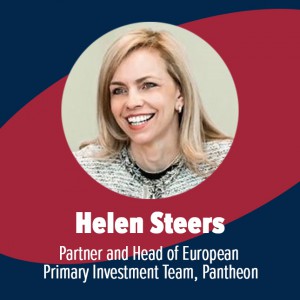"It’s energising to be part of a team that has an innovative, diverse culture that is cohesive and collaborative" - Helen Steers

Dorothy in conversation with LPs #4
 As part of SuperReturn’s series of interviews with LPs, Helen Steers, Partner and Head of Pantheon’s European Primary Investment Team, speaks to Dorothy Kelso, Global Head of SuperReturn, about her career, accomplishments and what trends she sees shaping the future of the industry.
As part of SuperReturn’s series of interviews with LPs, Helen Steers, Partner and Head of Pantheon’s European Primary Investment Team, speaks to Dorothy Kelso, Global Head of SuperReturn, about her career, accomplishments and what trends she sees shaping the future of the industry.
Dorothy: What is the biggest change you have seen in the industry since you started your career?
Helen: I’ve been working within the private equity industry since 1989 so I’ve certainly seen considerable change and evolution since then, but the evolution from a ‘fringe’ to mainstream asset class would certainly be one I would single out.
Dorothy: What trends are you seeing shaping the future of the industry?
Helen: One of private equity’s defining characteristics is its ability to innovate and respond to changing dynamics and investor needs, and in my view, that is a key reason why private equity has grown into a $3 trillion industry and why it has demonstrated enduring relevance to investors across the world.
Trends I would single out as shaping the future would include:
- The evolution of LPs: SWFs and large-scale institutional LPs are increasingly forming strategic partnerships, even joint venture initiatives, with single managers; the growing sophistication of LPs at the larger and more experienced end of the spectrum, where they’re in a position to go it alone, but where we see (and frankly, I would expect this to continue) them still turning to specialist managers for expertise and management of specific elements of their portfolio where their inhouse skills may be less developed; recognition of co-investment as offering strong partnership and alignment and its popularity with investors soaring commensurately; the increasing expansion of the ‘traditional’ PE investor base into the retail and smaller institutional markets
- The mega end of the market: super-size fundraising from brand name GPs; long-hold funds becoming established as an opportunity to potentially maximize returns by holding onto performing companies for longer
- The middle-market: continued strong investment appeal in the middle-market, where it will likely take deft navigation for both LPs and managers to identify and deliver value as the space becomes more crowded
- Investment in skills and diversity: considerable investment in operating resources as well as portfolio management skills and expertise by all sizes and types of GPs, as they recognise that the most reliable route to value creation lies in deep and sustainable operational improvements in their portfolio companies; more awareness of, and efforts to, improve the diversity of private equity firms
- New strategies: increased industry sector specialisation, which started with the larger GPs, but is now found increasingly in the mid-market; the offering of pinpointed investment strategies where a manager with the specific market expertise can develop highly targeted investment programs for investors; disruption and digital transformation; custom accounts; the gradual blurring of private equity into ‘private markets’ as investors start to take a multi-strategy approach to their so-called alternatives programs
- Private debt: the development of the private debt market, which has grown from effectively zero pre-GFC into an asset class that’s predicted to reach $1 trillion by next year
- Secondaries: the huge scale and increasing complexity of the global secondaries market
Dorothy: What advice would you give to an organisation looking to invest in alternative strategies (hedge funds, private equity, venture capital, etc)?
Helen: Take the time to define your expectations and requirements thoroughly; do your homework and due diligence on the manager universe that meets those parameters; talk to third parties that have or do work with those managers to get an independent opinion; clearly articulate your mandate requirements to filter out managers from your long-list.
Matching your requirements to your manager takes a lot of effort and shoe leather, but it’s the most effective preparation and advice I can offer to those entering the space. There just isn’t a shortcut that is likely to end well.
Dorothy: What are you glad to have accomplished?
Helen: Professionally I’m proud to have contributed to building a durable platform in Europe for Pantheon; that we have been chosen as an investment partner by well over 200 European clients, a number of whom have worked with us since the early 1990s; and that we continue to have access to outstanding, brand name GPs that I’ve had the pleasure to get to know deeply over three decades, as well as support newer managers get a foothold.
I’m proud that we continue to expand our European footprint in terms of AUM, number of clients and diversity of strategy we can offer, and that we have delivered performance to our clients. We’ve been a longstanding advocate of responsible investment, and I’m really proud of that. And it’s energising to be part of a team that has an innovative, diverse culture, that is cohesive and collaborative, and which truly feels like everyone is working towards shared goals.
Pantheon enjoys a unique ethos in my view – we work hard, we take what we do incredibly seriously, our clients come first, we value our GPs, but we also take time to socialise together and get to know one another as individuals as well as colleagues.
Personally, I’ve been lucky to have played a part in encouraging greater diversity within private equity and improving awareness of private equity as a fulfilling career choice for young women, most recently through my co-founding of Level 20 in the UK.
Dorothy: Those are amazing accomplishments. What advice would you give to others looking for a career in this field?
Helen: Give it a try! In my view, a career in private equity ticks multiple boxes and therefore is potentially well suited to a wide spectrum of people with varying skill sets. Yes, you need to have a strong academic profile, and it definitely helps to demonstrate some extra-curricular interests as well, and yes it can be very intense at times so some juggling is inevitable; and you need to be pretty resilient.
But it’s immensely fulfilling: you get to meet a huge number of interesting and diverse people, you develop a broad set of skills – so, for example, even if you are an investment professional you will develop marketing, relationship management and presentation skills – and that makes your days varied, and also exposes you to various disciplines so you can get a real perspective of what’s involved in managing a private equity program end-to-end.
I’d say – be open minded: you may think you are talented in a particular area, when you may actually be equally or better suited to another. In my experience, the opportunity to move between teams is something that private equity firms are generally open to. There can be fewer formal structures or silos. For the Millennial generation, given that flexibility is something they value, private equity should certainly be on their radar.
Dorothy: It’s been a real pleasure speaking with you Helen, thank you.
---
Under the spotlight: Helen Steers
Helen joined Pantheon in 2004 and has 30 years of private equity experience. She leads Pantheon’s European primary investment activity and chairs the European Investment Committee. She is also a member of the International Investment Committee and the Co-investment Committee. Helen joined Pantheon in 2004 from Russell Investments in Paris where she was Managing Director with overall responsibility for private equity in Europe. Prior to joining Russell in 1999, Helen spent five years as Director, European Private Equity with the Caisse de dépôt et placement du Québec. From 1989 to 1994, Helen was a senior investment manager at the Business Development Bank of Canada in Montréal.